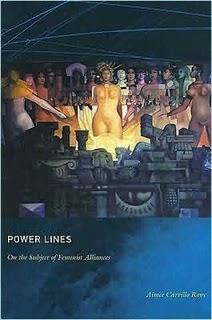Power Lines: On the Subject of Feminist Alliances

In the past year, I’ve noticed a trend towards bashing the contemporary Women’s Studies programs of U.S. universities. Mostly, I’ve heard critiques of this brand of academic feminism coming from (perhaps not surprisingly) communities of radical feminists, many of whom do not identify as scholars bound by an institution or a set of initials after their names. Myself both in the radical feminist category and also the past recipient of a gendered bachelor’s degree, I can sympathize with the range of emotions this topic can elicit. Academic feminism is known to be heteronormative, able-bodied, overwhelmingly white, and preoccupied with the concerns of middle class women. Yet academic feminists also hold considerable power—institutional power—and like it or not, that weight can benefit untold women around the world if we harness the opportunities this visibility can provide.
In Power Lines, Aimee Carrillo Rowe invites us to first examine those literal devices. Sometimes strung across major traffic intersections, sometimes buried for miles, power lines are agents of connectivity. In the same way, feminist alliances—specifically transracial ones—are our conduits of strength. The ways that feminists form alliances can reinforce and reproduce existing power structures, and drawing on nearly thirty conversations with self-styled academic feminists engaged in transracial coalition building, Carrillo Rowe examines how these alliances can be built, sustained, and the reasons why they fail.
Identity politics can be rocky terrain—commendably informative, guilt inducing, and sometimes damaging for all if not pursued with humility and compassion—but Carrillo Rowe argues that feminist alliances across individual boundaries can provide a sense of belonging, herself a living example of overlapping and conflicting identities: “a queer woman of Mexican, Anglo, and Franco descent, raised in a middle-class military family in Southern California.” Now an Associate Professor at The University of Iowa (disclosure: the very university where I received the aforementioned degree), Carrillo Rowe is in the unique position of navigating her existing identities while adding an additional label: academic. But from within the ivory tower, her voice articulates how we can move beyond the frustration of one-dimensional education and into a better space to most effectively benefit the most women through our varied positions, inside and outside of academia.
Scholars who revere Chela Sandoval and Gayatri Spivak will find another kindred researcher in their midst—assuming, of course, that they didn’t already know and lovingly consume Carrillo Rowe’s work. This examination of race, class, academic feminist theory, and transracial parternships will inform the future of disciplines ranging from rhetoric to social work. Using philosophy and feminist theory, this complex analysis will inspire the apathetic and cynical to reexamine the value of academic feminism.